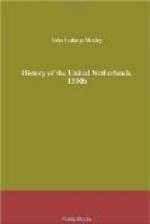the representative of national liberty and human rights against regal and sacerdotal absolutism, while himself a remorseless despot by nature and education, and a believer in no rights of the people save in their privilege to be ruled by himself; it seems strange at first view that Henry of Navarre should have been for centuries so heroic and popular an image. But he was a soldier, a wit, a consummate politician; above all, he was a man, at a period when to be a king was often to be something much less or much worse.
To those accustomed to weigh and analyse popular forces it might well seem that he was now playing an utterly hopeless game. His capital garrisoned by the Pope and the King of Spain, with its grandees and its populace scoffing at his pretence of authority and loathing his name; with an exchequer consisting of what he could beg or borrow from Queen Elizabeth—most parsimonious of sovereigns reigning over the half of a small island—and from the States-General governing a half-born, half-drowned little republic, engaged in a quarter of a century’s warfare with the greatest monarch in the world; with a wardrobe consisting of a dozen shirts and five pocket-handkerchiefs, most of them ragged, and with a commissariat made up of what could be brought in the saddle-bags of his Huguenot cavaliers who came to the charge with him to-day, and to-morrow were dispersed again to their mountain fastnesses; it did not seem likely on any reasonable theory of dynamics that the power of the Bearnese was capable of outweighing Pope and Spain, and the meaner but massive populace of France, and the Sorbonne, and the great chiefs of the confederacy, wealthy, long descended, allied to all the sovereigns of Christendom, potent in territorial possessions and skilful in wielding political influences.
“The Bearnese is poor but a gentleman of good family,” said the cheerful Henry, and it remained to-be seen whether nationality, unity, legitimate authority, history, and law would be able to neutralise the powerful combination of opposing elements.
The king had been besieging Dreux and had made good progress in reducing the outposts of the city. As it was known that he was expecting considerable reinforcements of English ships, Netherlanders, and Germans, the chiefs of the league issued orders from Paris for an attack before he should thus be strengthened.
For Parma, unwillingly obeying the stringent commands of his master, had sent from Flanders eighteen hundred picked cavalry under Count Philip Egmont to join the army of Mayenne. This force comprised five hundred Belgian heavy dragoons under the chief nobles of the land, together with a selection, in even proportions, of Walloon, German, Spanish, and Italian troopers.
Mayenne accordingly crossed the Seine at Mantes with an army of ten thousand foot, and, including Egmont’s contingent, about four thousand horse. A force under Marshal d’Aumont, which lay in Ivry at the passage of the Eure, fell back on his approach and joined the remainder of the king’s army. The siege of Dreux was abandoned; and Henry withdrew to the neighbourhood of Nonancourt. It was obvious that the duke meant to offer battle, and it was rare that the king under any circumstances could be induced to decline a combat.




